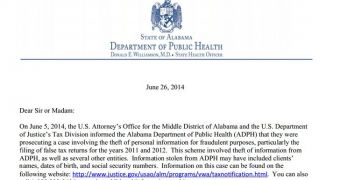Allegations of personal information theft from Fort Benning, Georgia, the Alabama Department of Corrections and the Alabama Department of Public Health have come to light in a case prosecuted by the Department of Justice, Tax Division.
DoJ Tax Division is working with the Attorney’s Office for the Middle District of Alabama on the case, which may also involve security incidents at companies located in the Columbus, Georgia area.
The criminals may have used the sensitive information for committing tax fraud by filing false tax returns in 2011 and 2012.
Letters from the Alabama Department of Public Health (ADPH) started to be sent to individuals on June 26, and warn that private details such as names, dates of birth, and social security numbers may have been compromised.
ADPH did not confirm a cyber-attack or that the security of the systems storing the details were breached in 2011 or 2012. Furthermore, there are no details about the number of the affected parties.
However, given that the Tax Division announced that multiple public institutions and private companies may have been affected by the criminal activity, the amount of exposed and compromised data should be pretty large.
ADPH advises all those believing that they’ve been victims of the incident to send proving documents to the Attorney’s Office by July 31. Also, they should notify the IRS as soon as possible, notify the FTC and contact the fraud departments of a major credit bureau.
The number of cyber-attacks incident disclosures from health-related entities has increased lately, with thousands of parties being affected. In most cases, there is no evidence that the information has been compromised, but exposing it to unauthorized persons is a major risk.
Recently, Corl Technologies has released a report on the data protection practices of 150 healthcare vendors, which have access to the data available on the systems of the healthcare organization they work with.
More worrying is the fact that the organizations do not know how many vendors can access the health details on their infrastructure.
The majority of the vendors that have been included in the study did not meet the minimum standards for guaranteeing the safety of the data, and this is understandable because they are not accountable for the low security standards they enforce on the systems.
“When healthcare and industry organizations don't hold vendors accountable for minimum levels of security, these vendors establish an unlocked backdoor to sensitive healthcare data,” says Cliff Baker, CORL Technologies CEO.

 14 DAY TRIAL //
14 DAY TRIAL //